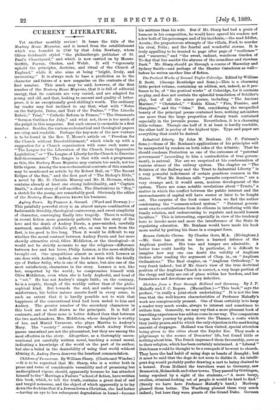Industrial Liberty. By John. M. Bonham. (G. P. Pntnam's Sons.)—Some
of Mr. Bonham's applications of his principles will be unexpected by readers on both sides of the Atlantic. That he should condemn Protection as one of the outcomes of "paternal government" (according to him a contradiction of true govern- ment), is natural. Nor are we surprised at his condemnation of various abuses a the railway system. The chapter on "The Relation of the Railway and the Trust to Industrial Liberty" is a very powerful indictment of certain practices common in the States. What Mr. Bonham calls "parasite corporations," are a very strange and, it would seem, noxious development of the system. There are some notable revelations about "Trusts," a matter in which the conflict between the public interest and the encroachments of capital will have sooner or later to be fought out. The surprise of the book comes when we find the author condemning the "common-school system." "Paternal govern- ment exacts contributions from its citizens in interfering with the family relation, and endeavouring to regulate and mould human faculties." This is interesting, especially in view of the tendency here to invoke more and more the interference of the State in regulating education. Mr. Bonham would have made his book more useful by putting his theses in a compact form.










































 Previous page
Previous page